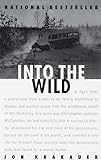My first book of 2017 was Jon Krakauer’s harrowing account of his ascent of Mt. Everest in May 1996. There are several accounts of the disaster surrounding the May 10, 1996 Everest expeditions, but Krakauer’s Into Thin Air is arguably the most famous.
Krakauer climbed Everest at the behest of Outside magazine, mainly to cover the guided expeditions that were gaining popularity at that time. These expeditions were controversial because many in the climbing community felt that inexperienced and possibly unfit people were attempting the dangerous climb and putting their lives (and those of their guides and sherpas) in jeopardy. In addition, concerns had been raised about the commercialization of Everest. For instance, the mountain became littered with the debris of climbers, from discarded oxygen canisters to other belongings, and frankly, even the bodies of those who did not make it back. It’s an absolutely riveting book about the dangers of hubris in the face of what is still one of the most dangerous places in the world. Krakauer describes the events leading up to a storm that approached as the expedition teams led by Scott Fischer and Rob Hall summited the mountain, and before all the members of the expeditions were able to descend, they were embroiled in a dangerous blizzard and a fight for their lives.
Krakauer has been criticized for parts of his account, and he has included a postscript to address some of this criticism. I found he was remarkably fair, though I freely admit this is the only account I’ve read. The reason I think he is fair is that he admits he feels partly responsible for the deaths of two the members of his team, Adventure Consultants, which was led by Rob Hall. He is fairly open and critical of his own lapses in judgment. He might even be hard on himself, given he was suffering from the effects of the altitude and the storm. He states he wishes he had never climbed Everest, but he admits in his introduction that “attempting to climb Everest is an intrinsically irrational act—a triumph of desire over sensibility. Any person who would seriously consider it is almost by definition beyond the sway of reasoned argument” (xvii). He wrote the book in part to attempt to deal with the post-traumatic stress disorder and depression that resulted from his experience on the mountain. Whatever culpability he ultimately has (which is debatable), it’s clear he has examined the events from as many angles as he could, including interviewing other survivors about their memories. He has done as good a job as it is probably possible to do, given the way the altitude, which made clear thinking virtually impossible, as well as the trauma of the event. Establishing the truth was difficult.
If I had the slightest notion I ever wanted to try anything like climb Mount Everest (and I assure you I didn’t—I am nowhere near fit enough to try climbing any mountain, let alone that one), this book would have cured me of the desire. Once the mountain had been conquered in the 1950’s, perhaps it was easy to forget the dangers it still held. Over 280 people have died trying to climb the mountain. In fact, 1996 was not even the deadliest year. English Mountaineer George Mallory has famously been quoted as saying, after being asked why he wanted to climb Mount Everest, “Because it’s there.” He perished in his attempt in 1924. His remains were found about three years after Jon Krakauer’s ill-fated summit of Everest.
This book has been on TBR list for a while. I actually accidentally bought two copies of it in my zeal to make sure I read it. I thought it was even better than Into the Wild, perhaps because of the personal nature of the story and very real anguish that Krakauer clearly feels. This book is personal. Krakauer is an excellent writer of narrative nonfiction.
Rating:




 This book is my first selection for the Backlist Reader Challenge 2017. I can’t recall how long I’ve wanted to read it, but I put it on my Goodreads to-read list on December 14; I’m pretty sure I bought both copies I own before then (I am sending one back!). I know I had plans to read it sometime last year after a conversation with a fellow teacher who had read it, but I was being lazy about adding more books to Goodreads for a while. It was originally published in 1997.
This book is my first selection for the Backlist Reader Challenge 2017. I can’t recall how long I’ve wanted to read it, but I put it on my Goodreads to-read list on December 14; I’m pretty sure I bought both copies I own before then (I am sending one back!). I know I had plans to read it sometime last year after a conversation with a fellow teacher who had read it, but I was being lazy about adding more books to Goodreads for a while. It was originally published in 1997.

